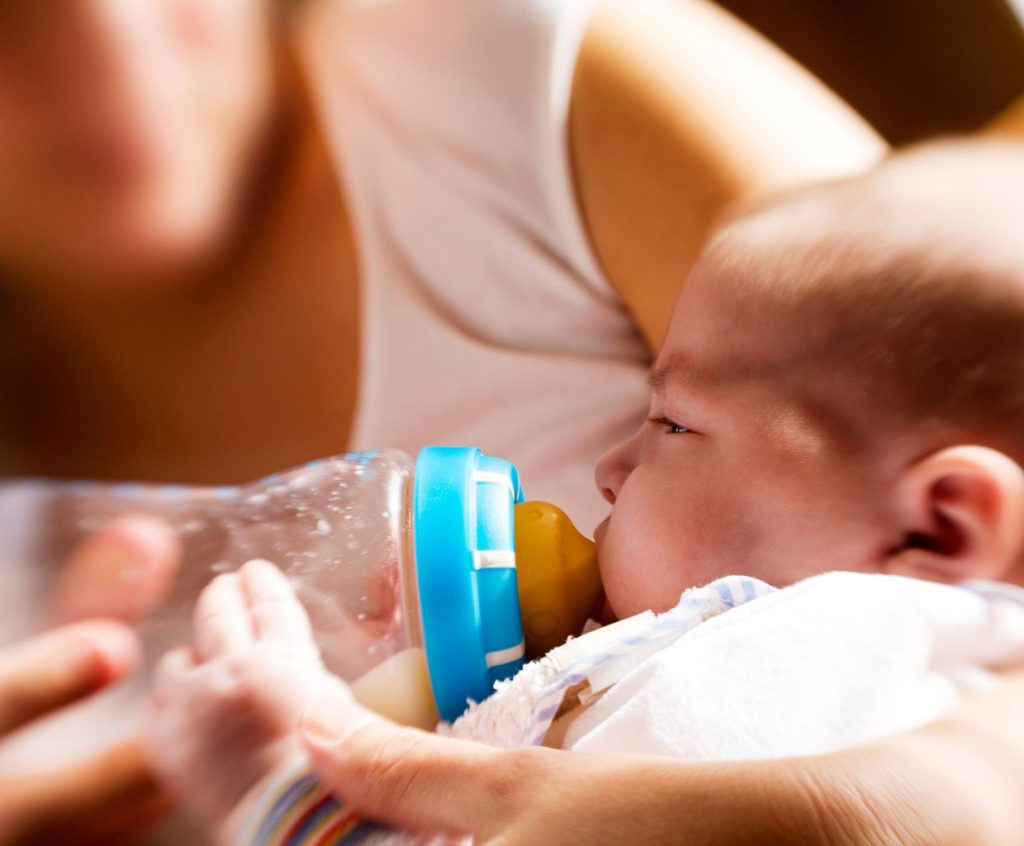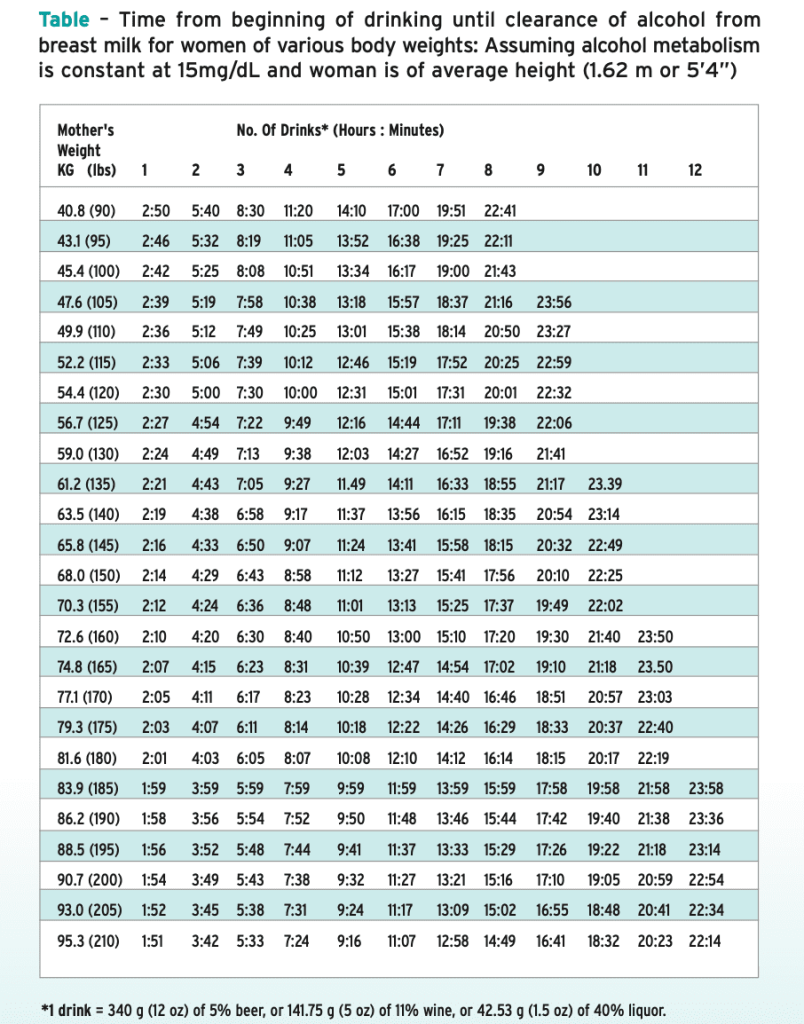Dire Consequences of Alcohol in breast milk
Today, we will answer this common question that many moms have about the consequences of alcohol in breast milk. It’s essential to know how long alcohol stays in your breast milk because it can affect your baby’s health, especially when young.
Alcohol is also known as ethanol and can be found in beer, wine, and hard liquor. It is not recommended for breastfeeding mothers, but if you drink, it’s essential to know how long it stays in your breast milk. The time that alcohol remains in your body depends on several factors, such as how much you drank, what kind of alcohol you consumed (beer or wine versus hard liquor), and how often you imbibe.

How long does alcohol stay in breast milk?
It is known that alcohol passes through breast milk quickly because there are no barriers between mothers’ blood flow and their milk ducts like there are between men’s blood flow and their sperm ducts; therefore, any amount of alcohol consumed by mothers gets into their milk as well as into their children’s bodies once they drink milk from their mothers.
This is how babies get intoxicated by drinking breast milk from their mothers who have consumed alcohol. Suppose a woman drinks alcohol while breastfeeding; her baby will absorb it through the digestive tract, just like any other food or drink the child consumes. The level of alcohol in the baby’s blood will depend on how much alcohol is in the mother’s milk and how much she has consumed.
So, how long can you detect alcohol in breast milk? The short answer is that it depends on how much you drink. The longer answer is that alcohol can be detected in breast milk for up to 48 hours after your last drink, but if you’re consuming more than two drinks per day, it could be detectable for as long as 72 hours. You should also note that alcohol will always be present at lower levels than in your bloodstream because it takes time for your body to process the alcohol and distribute it throughout your system. So, even if you haven’t had a drink in a while, you could still test positive on an alcohol strip.
According to the National Institute on Alcohol Abuse and Alcoholism (NIAAA), alcohol can pass from the mother’s bloodstream through the placenta and into her baby’s bloodstream during pregnancy and breastfeeding. The amount of alcohol that passes through a mother’s milk depends on how much she drinks, how quickly she metabolizes alcohol, and how much her baby drinks.
The NIAAA recommends that women who are breastfeeding or pregnant should abstain from drinking alcohol entirely, but if you decide to have one or two drinks, wait at least three hours between each one.
The main factors behind the levels of alcohol in breast milk
The amount of alcohol in breast milk depends on several factors, including:
1. How much alcohol you drink – the more you drink, the longer the alcohol will stay in your body.
2. How often you drink – the more frequently you drink, the longer the alcohol will stay in your body.
3. Your age – the older you are, the longer your body processes alcohol.
4. Your weight – if you are overweight or obese.
5. How much food has been consumed before drinking begins – if food is consumed before drinking begins, this may slow down how fast alcohol gets into your bloodstream.
6. The amount of alcohol you consume – drinking more than one standard drink in a sitting will increase the time it takes for alcohol to get out of your bloodstream.
7. Your metabolism rate – if you have a slow metabolism rate, it will take longer for alcohol to get out of your body.
What happens if a baby drinks alcohol in breast milk?
A baby’s brain is still developing, so she mustn’t ingest any alcohol until she’s at least 18 years old. In fact, according to the American Academy of Pediatrics (AAP), “no amount of alcohol is safe for children and adolescents.”
It’s not just the amount of alcohol that matters but also how quickly your baby absorbs it. Infants absorb alcohol more quickly than adults because their livers are not fully developed yet. This means that even if there isn’t much alcohol in the milk you give your baby, it will affect her system faster than an adult would be affected by drinking the same amount of alcohol.
Babies who drink milk laced with alcohol can become sleepy or incoherent and have difficulty feeding and breathing normally (elevated blood sugar levels and seizures). They may also become irritable or lethargic after drinking milk with alcohol in it. If any of these symptoms persist for more than 24 hours or are severe enough to warrant medical attention, your baby may have been poisoned by the alcohol, and you should consult a doctor.
Still, not much research has been done, and we don’t know the amount or level of alcohol that can cause problems. Some doctors believe a small amount does not harm a baby’s development or health, but it does change the flavor of breast milk and may cause discomfort for some babies. Some babies may feel tired or sleepy after drinking breastmilk that contains alcohol; others may become agitated or fussy.
Do breastfeeding alcohol test strips work?
These are useful if you want to check whether or not there’s any alcohol left in your system before pumping or breastfeeding. However, they’re not 100% accurate and should only be used as an initial guide—you should wait at least an hour after drinking before testing.
When you’re breastfeeding a baby, you want to be sure that your milk is safe. If you’ve been drinking, using alcohol breastfeeding test strips can help you know if your milk has any alcohol.
- See Alcohol Test Strips here.
No products found.
How Alcohol Breastfeeding Test Strips Work
Alcohol breastfeeding test strips are quick and easy to use—you dip them in your pumped breast milk, wait a few seconds for the results, and then see if there’s any color change on the strip or if there’s an audible alert (depending on what kind of strip you have). The more advanced versions can also detect other chemicals besides alcohol (like acetone and ethyl acetate), so they’re helpful if you try to avoid anything other than alcohol while breastfeeding.
There are two main types of tests: colorimetric and enzymatic. Colorimetric tests use chemicals that react with different compounds to produce different colors; these are usually more sensitive than enzymatic tests but are also more prone to false positives. Enzymatic tests use enzymes that interact with alcohol, acetone, and ethyl acetate; these are less sensitive than colorimetric tests but more accurate.
Alcohol in breast milk – Does alcohol stay in pumped milk?
Yes! Alcohol will stay in your breastmilk for up to three hours after drinking—even if there isn’t any detectable amount left in your system! Alcohol is fat-soluble and dissolves into the fats in your breast milk. Alcohol does not dissolve in water, so it takes a while to get out of your system and out of your breast milk.
- See also: BabyBuddha Breast Pump
Alcohol in breast milk – summary
In general, it’s best not to use alcohol while breastfeeding. If necessary, however, most doctors recommend waiting at least two hours before feeding your baby after drinking alcohol.
In addition, some experts recommend not drinking while breastfeeding because there are so many other ways than just through breast milk for babies to get exposed anyway!

